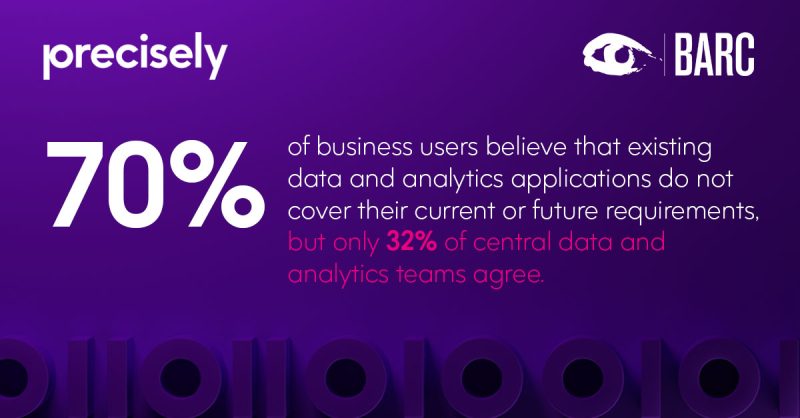Research Study Reveals Disconnect in Confidence in Data Integrity Between Data and Analytics Teams and their Key Business Stakeholders
Findings underscore differing perceptions of the efficacy of data architectures, data management, and even the data itself, for fueling confident decision-making
Precisely, the global leader in data integrity, in collaboration with Business Application Research Centre (BARC), today announced the results of new global research. The Future of Data Architecture study revealed major discrepancies in how data architecture and management is viewed across organizations – with central data and analytics teams generally satisfied with the future viability of their data landscapes, but business users unconvinced that existing architecture is modern enough to meet constantly evolving business needs.
The report found that while 70% of business users believe that implemented data and analytics applications do not cover their current or future requirements, only 32% of central data and analytics teams share the same sentiment. Furthermore, 52% of business users agree that existing data is not suitable for necessary business analysis, compared to only 36% of central data and analytics teams. The results show a clear disconnect between data and analytics teams and their key stakeholders – with business users unable to rely on trusted data for confident decision-making.

“As businesses increasingly focus on becoming more data-driven, they are being faced with huge volumes of data being generated at accelerated rates,” said Emily Washington, Senior Vice President – Product Management at Precisely. “The report clearly indicates a growing need for organizations to ensure that existing data management and architecture can meet, and adapt to, the fast-changing needs of the modern business. If organizations are lacking a clear strategy for data integrity, they will quickly find that the data fueling their most important decisions is inaccurate, inconsistent, and lacking vital context.”
The research further revealed the key challenges highlighted by business managers, including extensibility of real or near-time requirements (41%), comprehensibility of the data landscape or architecture as a whole (39%), and flexibility of extended data requirements (32%). The main drivers for modernization are the optimization of existing data models and processes, migration to cloud platforms, and efforts to improve the quality of source data or data interfaces.
Despite facing challenges with rising volumes of disparate data sources, the research revealed that 50% of organizations are continuing to rely on data warehouses as a design paradigm when redesigning their data architectures. However, executives and business users criticise the fact that centralized approaches cannot prevent the emergence of further data silos. Therefore, companies are looking to improve their source data to streamline their data pipelines and build a better basis for data virtualization.
“It’s encouraging to see that business leaders are increasingly focused on breaking down data silos, improving the quality of their data, and enriching it for maximum context. To achieve these goals, organizations must implement a robust strategy for data integrity – combining data integration, data governance and quality, location intelligence and data enrichment to provide a foundation of trusted data that can be shared across the business,” said Washington. “Whether the organization needs to automate decision-making, move fast and reduce costs, or manage risk and comply with complex regulations — a modern, and future-proof, data architecture is crucial to remaining agile in challenging times.”
Download a copy of the full report here.
Methodology
The study was based on the findings of a world-wide online survey conducted in March and April 2022. 268 responses were analyzed for the report, with global representation as follows: Europe (52%), North America (35%), Asia and Pacific (8%), South America (3%) and Africa (2%). The target audience was primarily data and analytics leaders or executive/C-Level roles, with representation across several industries – including IT, banking and finance, public sector, and retail.
About BARC
BARC (Business Application Research Centre) is one of Europe’s leading analyst firms for business software, focusing on the areas of data, business intelligence (BI) and analytics, enterprise content management (ECM), customer relationship management (CRM) and enterprise resource planning (ERP). Learn more at https://barc.de/
About Precisely
Precisely is the global leader in data integrity, providing accuracy, consistency, and context in data for 12,000 customers in more than 100 countries, including 99 of the Fortune 100. Precisely’s data integration, data quality, data governance, location intelligence, and data enrichment products power better business decisions to create better outcomes. Learn more at www.precisely.com